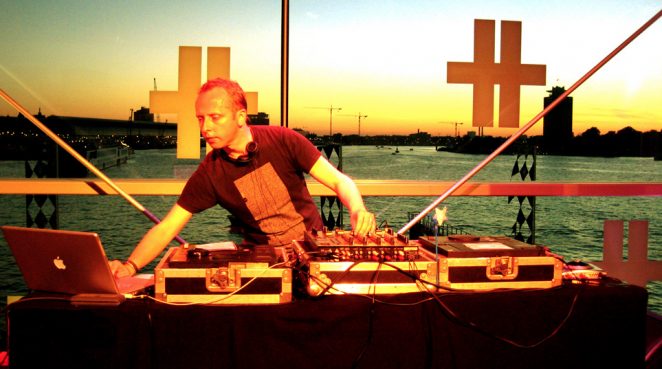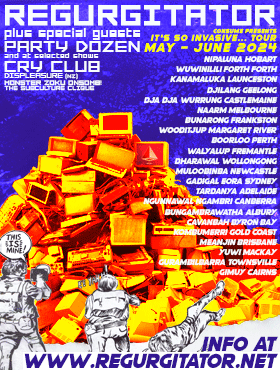
Scanner – Robin Rimbaud interview By Barrie Bardoe
I have previously interviewed Robin Rimbaud in some detail so the intention of this is to provide a bit of a ‘catch up’ on his activities. Rimbaud achieved notoriety by recording snippets of analogue mobile phone conversations and incorporating them into musical pieces. In the 1990’s he appeared on high profile compilations in genres such as Techno and Trip Hop, but his work was always experimental and largely genre-less. As instigator of the Electronic Lounge he created and nurtured a space where different creative fields could collide and learn from each other. In a time before the instant sharing that occurs with social media platforms this was a primary way for people to be exposed to cutting edge new ideas and the confluence of cultural and creative endeavours. (If you want to explore the background to this amazing artist please go here: http://australianmusician.com.au/the-scanner-robin-rimbaud-interview/ )
Recently I have seen footage of Robin using a modular synth system so that seemed like a good place to begin this update.
I gather you have been using a modular synth set up? Can you describe it to me and explain why you have made this choice?
I first used synths very early on in my music career. Interestingly I’ve been digitising those very recordings at the moment and found recordings from my earliest Scanner releases in the 1990s where I would run shortwave radio and found signals through a borrowed EMS VCS3 and process them in the process. However, I could never afford such joys and to be honest they were quite unreliable and needed servicing, whereas software was always so reasonably dependable in comparison.
Then ten years ago I was working in Richmond Virginia with my fine friend Stephen Vitiello, and he introduced me to his Doepfer oriented modular set up, and as the years passed I was drawn towards the possibilities of this way of working, introducing far more random and surprise elements to the mix. Modular synths have allowed me to combine my love of sampling with a working process that continues to suggest that the machines have a life of their own. I’m free of the screen and using my ears and not my eyes to make music. Most importantly it’s brought a renewed joy to music making and the community that surrounds it!
I recall reading in ’96 something Eno wrote about the ergonomics and physicality of music making – it seems to me that an over reliance on computers loses this aspect….what are your thoughts on this?
Absolutely – partly my reasoning moving outside of the box and the DAW is simply to engage the body again in music making, to return to a physicality of the sonic realm. A static body in front of a screen is not an image I find appealing, given that so much of our world is already accessed through that very medium.
I read your article on how ‘exposure’ is not payment – it seems we still have a long way to go with music being taken as a serious ‘product’ that deserves recompense like any other. Do you have any additional thoughts about why this might be the case?
The response to that Blog post was extraordinary. With well over 100,000 views of the original post and shared online in countless forums, it most certainly touched a nerve. I think it’s an issue with the creative arts in general, beyond just music though unfortunately. I have a plumber working for me this week and he will be paid well for his work. One would never ever consider offering him ‘exposure’ as payment. I might well share my enthusiasm for his work with others but that would be beyond any financial agreement. Designers, choreographers, photographers, lighting engineers, all share in a similar environment where their work is very easily misunderstood as to the real value and commitment of the individuals.
We live in a time which is very much about convenience, increasingly so, and as such anything we can access with least effort seems to lose value.
Laptops and generic programs have made it very easy for lots of people to make music most of which is fairly unexceptional. Some see this as democratisation, others as creating a glut that tends to ‘bury’ the good stuff – what are your thoughts on this?
I’m all for possibilities and the liberation of technology. Compare this to photography. Smart phones have made it easy for everyone to become a photographer, with sophisticated editing programmes bringing to life even the dullest photos. It doesn’t mean that everyone wants to become a professional photographer, nor to study the art of lighting, composition and so on, but I don’t feel that’s a problem. We have music software that can offer almost anyone a rewarding and joyful creative experience.
The issue here though is the voice of that person, or their eye if it’s a photographer. What we recognise in music and arts that we enjoy is character, tone, structure, shape. That character can’t be downloaded via software. The voice that an artist presents where you immediately recognise a tune of theirs doesn’t come from software or easy solutions. Software enables, but the work needs to speak of the creator, not of the software developers.
You continue to be involved with interesting projects that span many different media platforms and social contexts – can you talk a little about how you keep this going…for example do you have a day per week where you work on sourcing new projects etc.? In a nutshell how do you manage your career?
Yes, I’ve been very fortunate to work on some quite extraordinary projects over the years, that frequently move beyond the span of simply releasing music and playing shows. In fact, I rarely play live these days and focus more on these time-based and other challenging things as far as possible. Without wishing to sound arrogant I spend almost no time at all ‘sourcing’ new projects, as they generally follow through quite organically. I suppose when you’ve created and collaborated to the extent I have over the last twenty-six years; your influence or body of work speaks for itself in some ways.
As to managing my career? I remain fiercely independent, with no manager, agent, promoter, record label, or music publisher. Not even a stylist 😀 I wake up early every day and work. I have a list of around 30 projects I’m currently working on, from film scores to musical collaborations, and deal with them as they come in. I also allow myself plenty of play time, and always stop in the studio at the very latest at 18.00. I feel it’s invaluable to recognise and enjoy life outside of this space too! I also don’t need to be rich or ‘famous’ whatever that might even mean. I have enough to do the things I want to and don’t live beyond my means. It’s simple but happy!
Can you outline what some of the projects upcoming that you find especially interesting, and maybe a little about how they came about?
I just finished creating the sound design for a forthcoming Channel 4 television arts ident, having been invited by the curator of the programme. I also just completed a series of new works based on answer phone messages from the British writer Anthony Burgess for a special release in 2019, again at the invitation of the curator. I am continuing to work with an extraordinary artist Kasia Molga, http://www.codeofsoil.com/ with whom I’ve been friends with for many years, on a very special project exploring the value of soil in our environment, in an expansive installation in a museum in 2019. At my own volition, I also just released Mass Observation (Expanded) on Australian label Room40, and Ash 1.7 on Bandcamp (https://scanner.bandcamp.com), having discovered these unheard works in my archive. And so on
We now have endless online platforms for the dissemination of music, most of which seem to make it tough for artists to get payment……what are your thoughts on the state of play with what the internet offers artists?
It’s a very complex situation today regarding such situations as the internet of course, but let me speak from my own perspective. I never entered into making work to sell product. It was a very natural and organic process and in fact, whether I sell five copies of a release or five thousand, really hasn’t made any significant difference to me financially at least. I suppose it’s about exposure and works are like business cards. I work on many projects that reach audiences that would never ordinarily interact with it, so for example when I score contemporary dance the audiences are exposed to my work in ways a CD or digital release could never match. Last year alone my work was heard by about 8million people statistically!
In many ways, artists today have a better potential reach for their work, but it’s also a huge struggle, since the networks that offer these outlets recognise that, encouraging you to pay for their services in awkward ways, or else they strangle your posts so limit audience access.
Anything else you want to add?
Sign up to my newsletter for exclusive monthly updates and exclusive tales. I’ve been writing and sending this out every single month, on the first day, for over 24 years now, long before blogs and newsletters became the bane of our lives!
http://scannerdot.com/newsletter-strom/


